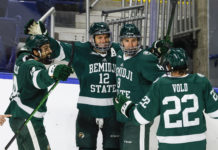We’ve all heard it in the college hockey game: There has to be a way to score more goals.
Last weekend, goals weren’t necessarily at a shortage as playoff hockey got underway in the three Eastern conferences — Hockey East, ECAC Hockey and Atlantic Hockey. Air Force and Harvard each put up six goals on Friday. Union dropped a seven spot on Saturday and Notre Dame followed with seven on Sunday. And of course, there was Air Force’s 10 goals on Saturday to total 16 for the weekend.
But while that was all happening, there were multiple games that went long stretches without goals. None was more notable than Friday’s Notre Dame-Massachusetts game which went 111 minutes, 44 seconds — between the final two seconds of the second period and the 11:42 mark of the fifth overtime — where neither team could score.
That game became the longest in the history of college hockey, surpassing Quinnipiac and Union’s marathon of 150 minute, 22 second marathon from 2010 by 80 seconds. But before the weekend ended, three games were added to USCHO’s list of the 50 longest games in Division I men’s history. A double-overtime game Saturday afternoon between Merrimack and Northeastern, won by the Warriors 2-1 to clinch the series, is the 27th-longest game in history. Later that night, Holy Cross beat Niagara 2-1 in three OTs in what is the eighth-longest game overall and longest in Atlantic Hockey history.
A weekend such as this is rare. March 10 and 11, 2006, produced four games that are now on the list of the 50 longest games, but of those, the longest was only 94:30, between Bentley and Army, the 31st-longest game.
The 2008 postseason probably produced the most bonus hockey with games on the weekend of March 7-9 ranking 12th (Yale 3, Rensselaer 2 in 3OT — 105:40) and 13th (Omaha 2, Alaska 1 in 3OT — 104:22). That season produced five games total on the top 50 list.
But possibly the most telling statistic in reviewing the top 50 longest games list is that 38 of those 50 games occurred since 2000. Better said, on March 8, 1997, when Colorado College beat Wisconsin 1-0 in four OTs, a game that lasted 129 minutes, 30 seconds, it broke the record for longest game all-time that had stood for almost 29 years, since North Dakota beat Minnesota 5-4 in 102 minutes, 9 seconds. Since that Colorado College-Wisconsin game 18 years ago, 12 other games have been longer than the 1968 affair and three of those games have surpassed the CC-Wisconsin tilt.
The story here rests simply on how difficult it has been to score. On that top 50 list, only two games happened before 1980, when college hockey was a wide-open, offensive affair. Only two games in the ’80s and seven games in the ’90s appear on the list. Long story short, no matter what the officials in college hockey are doing to create more offense, we’ll never reach the levels of the ’90s, ’80s or prior. Todd Milewski last week chronicled how offense continues to go down despite ongoing rules changes aimed at increasing offense.
Don’t read into this as a personal complaint. I love tight-checking offense, defensive systems and better-trained goaltending. I also love watching from afar these marathon games. But certainly know that whatever anyone tells you, it’s harder than ever to score goals in college hockey. And all best efforts aren’t going to change that any time soon.
